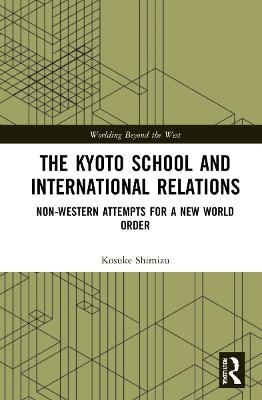
The Kyoto School and International Relations
Routledge (Verlag)
978-1-138-62495-5 (ISBN)
The Kyoto School and International Relations explores the Kyoto School’s challenge to transcend the ‘Western’ domination over the ‘rest’ of the world, and the issues this raises for contemporary ‘non-Western’ and ‘Global IR’ literature.
Was the support of Kyoto School thinkers inevitable due to the despotism of military government, thus nothing to do with their philosophy, or a logical extension of their philosophical engagement? The book answers this question by investigating individual Kyoto School philosophers in detail. The author argues that any attempts to transcend the ‘West’ are destined to be drawn into power politics as far as they uncritically adopt and use the prevailing ontological concept of linear progressive time and dominant meta-narrative of Westphalia. Thus, to fully understand this problem, there is the need to be cautious of the power of language of Westphalia and the concept of time in IR.
Aimed at students and scholars of IR theory, Japanese politics and East Asian IR in general, this book provides some introductory explanations of these academic subjects, developing a theory based on the concepts of time and language of Kyoto School philosophy.
Kosuke Shimizu is Professor of International Relations in the Department of Global Studies and the Director of the Research Centre of World Buddhist Cultures at Ryukoku University, Kyoto, Japan, and Research Associate of the University of Pretoria, South Africa. He was Visiting Scholar of Copenhagen University, Denmark. His recent publications include ‘Political Healing and Mahāāa Buddhist Medicine: A Critical Engagement with Contemporary International Relations’, Third World Quarterly (2021), and ‘An East Asian Approach to Temporality, Subjectivity, and Ethics: Bringing Mahāāa Buddhist Ontological Ethics of Nikon into International Relations’, Cambridge Review of International Affairs (2021). He has also published two edited books in English: Critical International Relations Theories in East Asia: Relationality, Subjectivity, and Pragmatism (2019) and Multiculturalism and Conflict Reconciliation in the Asia-Pacific: Migration, Language, and Politics (2015, co-edited with William S. Bradley).
Note on Names and Translations
Preface
1 Introduction
2 East Asian IR Revisited
3 Encounter, Transformation of Time and Self-Colonisation: The Japanese Modernisation
4 Nishida Kitaro and Tanbae Hajime: The First Generation of the School
5 The Transcendental Whole and ‘Inclusiveness’: The Discourse of the Big 4
6 Miki Kisyoshi’s Philosophy of Imagination: Towards Everyday Life
7 Tosaka Jun’s Theory of Critical Relationality: Morality of Everydayness
8 The Reception of the Kyoto School Philosophy in the Post-war Era
9 Bringing Bodily Experience Back In Post-war Japanese IR
10 Conclusion: Towards a Mahāyāna Buddhist IR?
Bibliography
Index
| Erscheinungsdatum | 14.03.2022 |
|---|---|
| Reihe/Serie | Worlding Beyond the West |
| Verlagsort | London |
| Sprache | englisch |
| Maße | 156 x 234 mm |
| Gewicht | 453 g |
| Themenwelt | Sozialwissenschaften ► Politik / Verwaltung ► Europäische / Internationale Politik |
| Sozialwissenschaften ► Politik / Verwaltung ► Politische Theorie | |
| ISBN-10 | 1-138-62495-0 / 1138624950 |
| ISBN-13 | 978-1-138-62495-5 / 9781138624955 |
| Zustand | Neuware |
| Haben Sie eine Frage zum Produkt? |
aus dem Bereich


